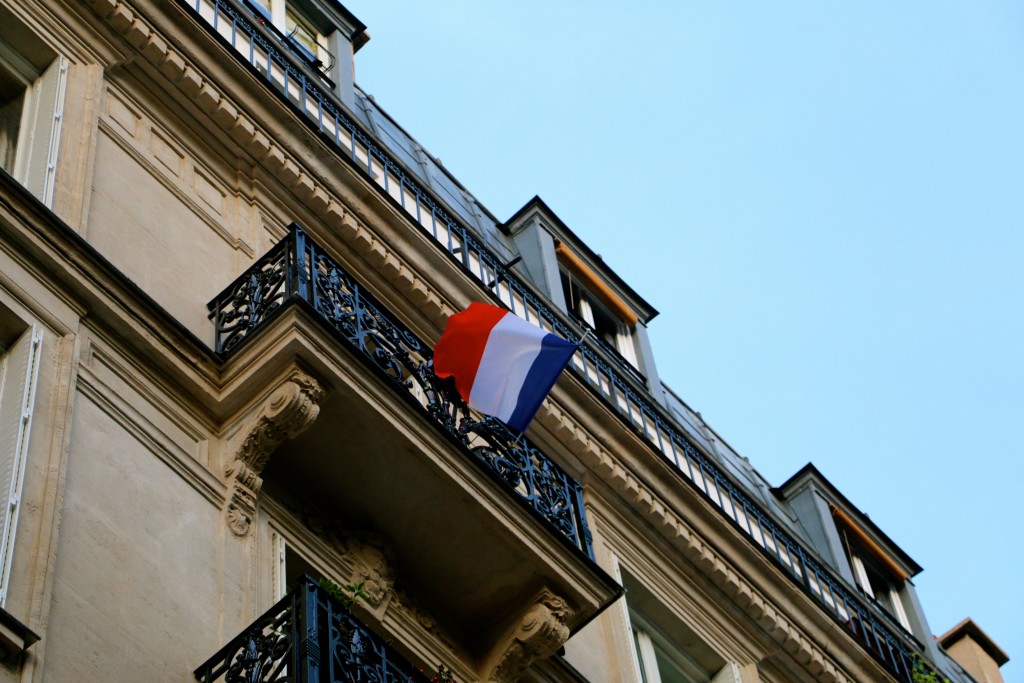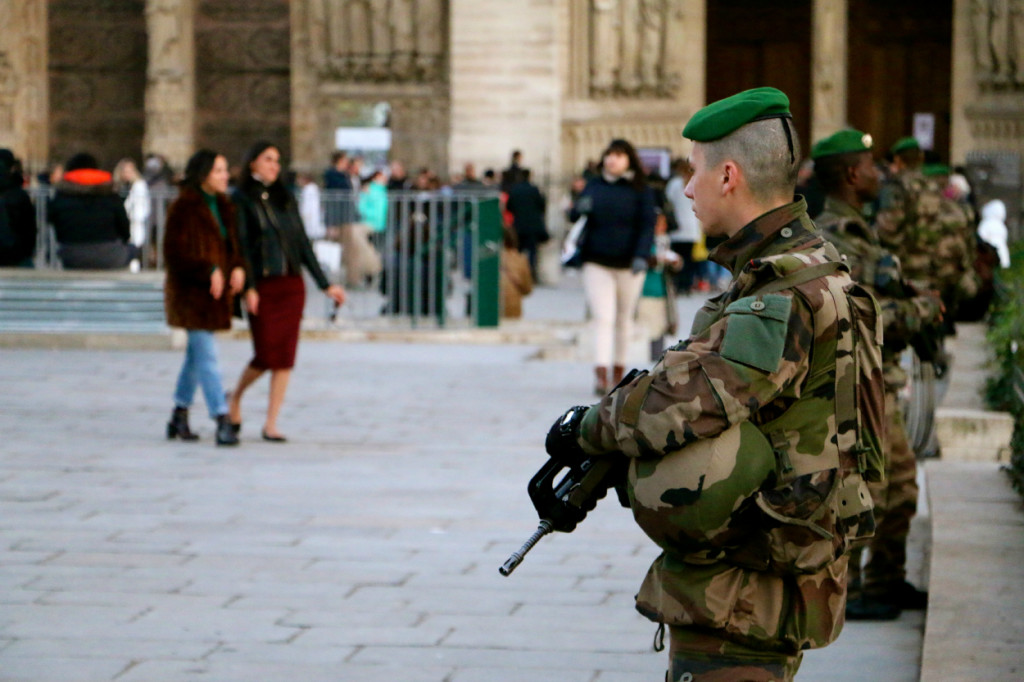Has the French President’s Call to Arms Against ISIS Fizzled?
Nolan Peterson /
PARIS—After the bloody terrorist attacks in Paris on Nov. 13, French President François Hollande declared war on the Islamic State, also known as ISIS. But although he employed tougher rhetoric, Hollande didn’t necessarily make an about-face in French counterterrorism policy.
“The objective is clear: Daesh must be destroyed,” Hollande told his Defense Council the day after the attacks, using a pejorative Arabic acronym for the Islamist terror group.
In the weeks that followed, the French president undertook a marathon transcontinental diplomatic blitz to rally reluctant world leaders against ISIS.
In a four-day stretch from Nov. 23 to 26, Hollande received British Prime Minister David Cameron in Paris, flew to Washington to visit President Barack Obama, returned to Paris to meet with German Chancellor Angela Merkel, and then flew to Moscow for a sit-down with Russian President Vladimir Putin.
Hollande said the Nov. 13 attacks—which killed 130, wounded 683, and were France’s worst mass casualty attack since World War II—were an “act of war … organized and planned from the outside.”
“We’re at war against jihadi terrorism,” Hollande said in a Nov. 16 speech to the Congress of the French Parliament.
Call to Arms
Hollande’s recent call to arms contrasts with the French reaction to the terrorist attacks in January, when jihadists killed 17 across Paris, including 12 in a shooting at the office of the satirical newspaper Charlie Hebdo and four at a Jewish kosher supermarket.
Those attacks spurred an introspective, nationwide debate on integrating France’s Muslim minority. “There are fractures, huge, gaping, in our society that must be resolved,” Bruno Le Roux, leader of France’s Socialist Party, said in the wake of the January attacks.
Two key events highlight the evolution of French rhetoric since January.
First, in a televised speech Jan. 20, French Prime Minister Manuel Valls singled out domestic cultural rifts as a national security threat:
These last few days have emphasized many of the evils which have undermined our country from within, or challenges we have to face. To that, we must add all the divisions, the tensions that have been brewing for too long and that we mention sporadically.
Referring to the condition of France’s Muslim minority, Valls added: “A territorial, social, ethnic apartheid has spread across our country.”
The second event was Hollande’s Nov. 16 speech before the Congress of the French Parliament, a unified body of the National Assembly and Senate, which meets at the Versailles Palace for exceptional occasions. In it, the French president struck a more martial tone. He spoke about the eradication of terrorism and declared war on ISIS:
We are going to lead a war, which will be pitiless. Because when terrorists are capable of committing such atrocities, they must be certain that they are facing a determined France, a united France, a France that is together and does not let itself be moved, even if today we express infinite sorrow.
On Nov. 25, the French newspaper Le Monde reported: “The Charlie Hebdo attacks raised questions about how French society could have produced these terrorists. The attacks of Nov. 13, even though they were perpetrated by French and Belgian nationals, were cast as the action of an external enemy, the Islamic State, which should be fought in Syria.”
Emergency Measures
His rhetoric aside, Hollande’s declaration of war on ISIS wasn’t necessarily a sharp change in French counterterrorism policy.
France began bombing ISIS targets in Iraq in September 2014, the first European country to do so. France expanded its airstrikes into Syria a year later, on Sept. 27. France also maintains 3,500 troops deployed to North Africa as part of an ongoing counterterrorism mission called Operation Barkhane.
After the Nov. 13 attacks, French warplanes pummeled ISIS targets in a wave of retaliatory airstrikes. Hollande sent an aircraft carrier, the Charles de Gaulle, and its 26 warplanes to the Mediterranean, more than doubling France’s airstrike potential in the region.
Hollande did not, however, invoke Article V of the NATO charter, which would have taken the 28-country alliance to war against ISIS.
France also launched an offensive on the domestic front of its “war on jihadi terrorism.” Hollande declared a three-month national state of emergency, which includes a ban on public demonstrations.
New surveillance and intelligence gathering measures have gone into effect, including communications metadata collection under a July 2015 law. French authorities have wide latitude to make arrests, detain suspects, and shut down mosques singled out as hotbeds of radicalization.
As of Dec. 4, French authorities had shut down three mosques for links to Salafists, adherents of a radical form of Sunni Islam. Additionally, under France’s emergency measures, authorities have carried out 2,235 house searches, which led to 263 interrogations; taken 232 into custody; and opened 346 judicial proceedings.
Defending the emergency measures, French Interior Minister Bernard Cazeneuve said: “Terrorism is the threat to freedom, not the state of emergency.”
Root Causes
Underlying the domestic security crackdown are larger, decades-old questions related to the integration of France’s Muslim minority. Some argue that this cultural schism is at a tipping point, leaving disaffected French Muslim youth vulnerable to recruitment by extremist groups like ISIS.
According to French intelligence services, about 2,000 French citizens have joined jihadist networks in Syria and Iraq, with 571 still known to be on the battlefield as of November.
“France’s broader battle is to head off the homegrown threat by opening up more promising opportunities for those most at risk of being radicalized,” The Wall Street Journal’s Simon Nixon wrote Nov. 22. “That, in part, requires a vibrant economy able to create worthwhile jobs.”

Many Parisians have displayed the French flag as a sign of national unity. (Photo: Nolan Peterson/The Daily Signal)
Hollande is France’s least popular president in modern times, largely due to staggering unemployment and an anemic economy.
European Union data forecasts that French unemployment will end 2015 at 10.4 percent, up from 9.8 percent when Hollande took office in May 2012. Youth unemployment is at 24 percent. Unemployment among Muslim youth is at 40 percent.
With regional elections Dec. 6 and 13, and the far-right National Front party surging in the polls after the Nov. 13 attacks, some question whether Hollande’s declaration of war on ISIS had political motives. They see it as a way to dodge more difficult decisions concerning root causes behind the radicalization of some French Muslims.
“It was a political decision; Hollande has gone up in the polls,” Regis Aernouts, an antiques dealer in Paris’ Sixth Arrondissement, said in an interview with The Daily Signal. He added:
But the real problem is the horrifying condition in which Muslims live in the ghettos. France is basically split into two countries now, and it may be too late to reverse what we have let happen for decades. France is truly deep in the merde.
Yet French voters support military action. A Sept. 13 poll conducted by the French newspaper Le Journal du Dimanche two months before the attacks found that 56 percent of respondents supported sending ground troops to Syria.
On Friday, Le Figaro magazine released a new poll indicating that Hollande’s national favorability rating has jumped by 20 points in the past month, reaching the highest level since the beginning of 2013. Another poll by Paris Match showed that voter approval for Hollande has risen 22 points since the Nov. 13 attacks.
Stalemate
Following Hollande’s diplomatic entreaties, Germany began surveillance flights over Syria and pledged 1,200 military personnel (albeit in non-combat roles) to the anti-ISIS coalition. For its part, the United Kingdom launched airstrikes in Syria on Dec. 3, following a heated debate in the House of Commons.
Yet, with Turkey downing a Russian Su-24 attack plane on Nov. 24 and Moscow and Washington still at loggerheads over the fate of Syrian dictator Bashar al-Assad, any joint operations with Russia in Syria are likely off the table for the time being.
It’s not quite the global banding together under the Tricouleur that the French president might have envisioned. And despite Hollande’s best efforts, the war against ISIS remains a stalemate.
“British airstrikes won’t have any effect,” security analyst Matthew VanDyke told The Daily Signal.
VanDyke, who fought with anti-Gaddafi rebels in the Libyan civil war, heads Sons of Liberty International, a nonprofit security firm based in Iraq that trains and equips Christian militias to fight ISIS. He said:
The British don’t have any additional capabilities beyond what the U.S. has, so unless their rules of engagement are much looser than the U.S., their participation in the air campaign will be largely symbolic and definitely not a game-changer.
A 62-nation coalition called Operation Inherent Resolve remains overwhelmingly dependent on U.S. airpower, Russia is still playing by its own rules, and the absence of a credible ground force to take back or hold territory has dampened any immediate hopes for defeating ISIS.
VanDyke told The Daily Signal:
Things in Iraq and Syria are increasingly appearing to be at an intentional stalemate. The various factions here could mostly care less about fighting ISIS and are maneuvering to take advantage of the situation and position themselves for what Iraq and Syria will look like after ISIS is defeated. There is really no ground force to fight ISIS in Iraq, and not much of one in Syria, either.

